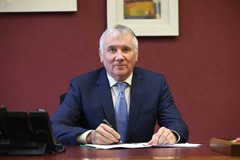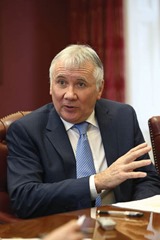Focusing on delivery
 Head of the Northern Ireland Civil Service Malcolm McKibbin talks to Owen McQuade about the Executive’s focus on delivery and the need to see public services from the citizen’s perspective.
Head of the Northern Ireland Civil Service Malcolm McKibbin talks to Owen McQuade about the Executive’s focus on delivery and the need to see public services from the citizen’s perspective.
Two years into leading the Civil Service, Malcolm McKibbin has a good overview of the considerable variety of work carried out by the Northern Ireland Civil Service. Indeed, he feels “quite proud and privileged” to have a very detailed oversight of activities that range from “providing schools for our children, hospitals for those who are unwell, paying benefits, managing roads and transportation, providing social housing, protecting the environment, managing forests and rivers and helping rural communities and farmers – a vast range of activities that impact on everyone’s life in Northern Ireland.”
McKibbin continues: “It has been an interesting experience to see that total picture. When I came into this post, I had a clear view of what the Civil Service should do and I felt its role was to serve the government of the day, to deliver the Executive’s priorities including its Programme for Government [PfG] and to ensure the Civil Service has the capability to serve future governments well.”
With the public sector dominating the local economy, he is asked for his thoughts on how he sees that evolving in the future. In answering the question, he looks back to when he was appointed in October 2011.
“One of the first things I did was to assist the Executive in preparing a new Programme for Government that had 82 commitments in it compared to 400 in the previous PfG,” he reflects. “It was a much more focused document and it identified priorities for rebuilding and rebalancing the economy along with helping the disadvantaged.” Shortly afterwards, the Economic Strategy was prepared with DETI taking the lead and focusing on initiatives to help improve the economy over the short, medium and longer term.
“The relative size of the public sector,” he says, “compared to the private sector is much bigger than in the rest of the UK and that has meant we probably have been slower into recession but we might not get the private sector pull to get us out of recession as quickly.” However, he was encouraged to see recent figures which indicate that the Northern Ireland economy has grown by 1.6 per cent in the last quarter compared to a UK average of half of that figure.
Reform
McKibbin’s predecessor, Bruce Robinson, took a very focused approach to reform with the shared services programme. McKibbin sees the next phase of reform as addressing external issues. One of the commitments in the Programme for Government was to consider the post-2015 structures of government.
He comments: “There are two main considerations: one, political and secondly, from my perspective, administrative efficiency. The latter would point to a reduction in the number of departments.”
As far as the Review of Public Administration is concerned, he points to the elections to the 11 new councils in May this year: “This will change things considerably with the transfer of functions from central government including, planning, urban regeneration, local tourism, economic development and that, along with the new community-led planning process, should provide councils with powerful tools to help shape their council areas.”
Of his predecessors as Head of the Northern Ireland Civil Service, Sir Bruce Robinson’s tenure was associated with reform and implementing shared services and before him Sir Nigel Hamilton was focused on governance. McKibbin is asked for a theme with which he would like to be associated.
“The defining theme of my time in this post is implementation,” he states. “The 2007-2011 mandate was about establishing trust and stabilising the institutions. In 2011, the First Minister and deputy First Minister made it very clear to me that they wanted this mandate to be about delivery and that is what we have been focusing on in the PfG.” McKibbin recalls that the First Minister reported to the Assembly’s OFMDFM Committee that 80 per cent of the commitments in the PfG were largely on track, and that remains the position today.
That is “considerably further ahead” than the last PfG at this stage and the Executive has also introduced governance structures to “keep our eye firmly on the achievement of these commitments.” The First and deputy First Ministers chair a programme board, facilitated by McKibbin, which also includes the Finance Minister: “We assess commitments to see which are not being achieved and if there is anything we can do to facilitate their achievement. I chair a group of all my permanent secretaries and we look at progress against each commitment and see if there is anything we can do to improve delivery.”
For each of the 82 commitments, there is a senior responsible officer and an associated delivery plan. This programme and project management approach will prioritise delivery more so than in the past.
 Has this approach been influenced by his background as a civil engineer and his time at the Roads Service?
Has this approach been influenced by his background as a civil engineer and his time at the Roads Service?
“To a certain extent, I don’t doubt that,” he reflects. “I worked in delivery organisations where performance was assessed against how well you delivered.” All the other regional administrations are also concentrating on delivery and “nowadays central government undoubtedly focuses on implementation as well as good policy formulation.”
Moving on to some of the softer issues, we discuss the culture of the Northern Ireland Civil Service and what it should aspire to.
“As with any major organisation, we want it to be more innovative than it currently is,” he comments. “We want it to be flexible and decisive and we want to ensure that our actions achieve the outcomes we are aiming for. In addition, there are core values of impartiality, honesty, objectivity and integrity. These are absolutely key in my mind, in ensuring that the Civil Service acts in an impartial and helpful way to whatever government is in place.”
Change
In recent times, some of the changes in the Civil Service centre around an increasing professionalism. “We now have more accountants and economists than in the past,” he says. “There are now also many different strands of professionals from civil engineers, veterinarians to various health professionals. There is also undoubtedly, with devolution, a much closer relationship with ministers which is important. Local ministers make it abundantly clear what they expect from civil servants and what they expect from their organisations.”
McKibbin has been recognised for his strong leadership. When asked about his leadership style and if it has been shaped by the difficult economic times, he replies: “No doubt there are different styles of management that could be used in the complex and dynamic environment in which we operate. The style and skills sets have to be appropriate to the current circumstances and I hope mine are right for this time.”
He adds: “Certainly I have tried to take a leadership role and I have encouraged the permanent secretaries to do the same.” He thinks that civil servants within the system have a right to expect leaders to lead – “that is what we are getting paid for.” Leaders have to lead “in such a way that will give staff a clear idea of where they are going and that, in turn will
create more leaders throughout the organisation.”
In addition to being Head of the Civil Service, McKibbin is also Permanent Secretary for the Office of the First Minister and Deputy First Minister. He is asked whether it is more difficult to deal with government as a whole than being a Permanent Secretary focused on one department.
“Undoubtedly the job is more political and OFMDFM is a different department than any other because other departments have one Minister and one special adviser,” McKibbin comments. “In OFMDFM, we have the First Minister, the deputy First Minister, two junior ministers and seven or eight special advisers – and because it is a joint office it is important to broker deals and get agreement on issues and that is understandably more complex than in other departments. You also tend to be dealing with issues on a more strategic level.”
In conclusion, we turn to the one thing he would like to have progressed during his tenure. “I certainly want to improve the implementation ability of the Civil Service and I also want to improve the services we deliver to the public,” he says. “We know that the public don’t know, or even care about, the boundaries that exist across central government or with local government. We need to think about how we deliver services from the perspective of the citizen.”
The Civil Service has carried out a ‘landscape review’ of the services which involve large volumes of transactions with citizens. It plans to transform and digitise these services and to deliver them in a more effective manner.
“I was looking at the top 18 high volume services that we deliver and there are only about 20 per cent of them online,” he remarks. “I am determined to improve the service to the citizen and reduce the cost base by moving more of these online.”
Profile: Malcolm McKibbin
A civil engineer by training, Malcolm McKibbin graduated from Southampton University “and would have stayed in England after graduating had my local rugby club, Instonians, not been going on a three week tour of South Africa.”
Malcolm came back for the tour and got a job with Roads Service where he worked for “many enjoyable years,” ending up as Chief Executive. He also did a spell leading the development of Northern Ireland’s first Regional Transportation Strategy. He then became Permanent Secretary of the Department of Agriculture and Rural Development which was a “change of culture” for him. After a short period as Permanent Secretary at the Department for Regional Development, he took up his current role.
Malcolm has been married to Susan for 32 years and they have two daughters: Jenny (23) who is working in New York and Christine (26) who works in Newcastle upon Tyne. To “keep himself sane”, he has always been involved in sport, either playing or coaching rugby, and he still plays tennis competitively.
